#how fascism works
Photo
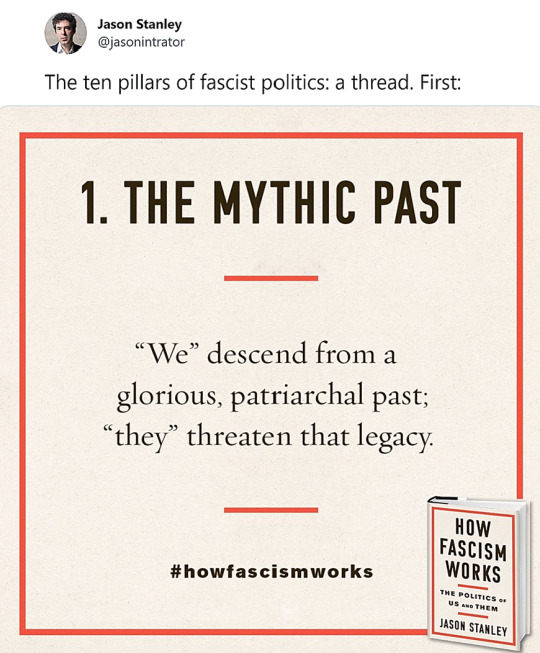
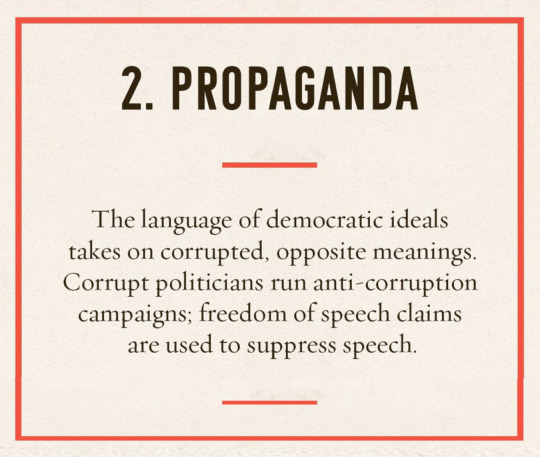

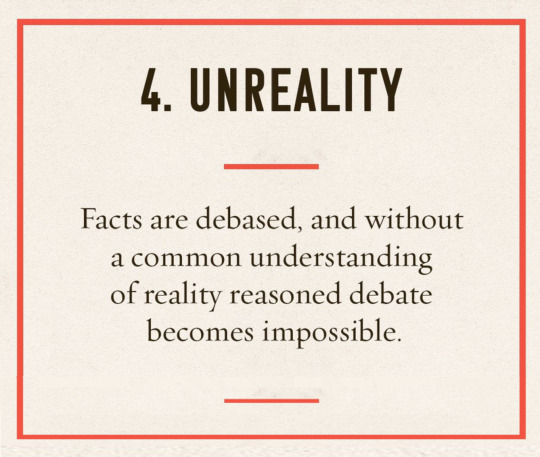
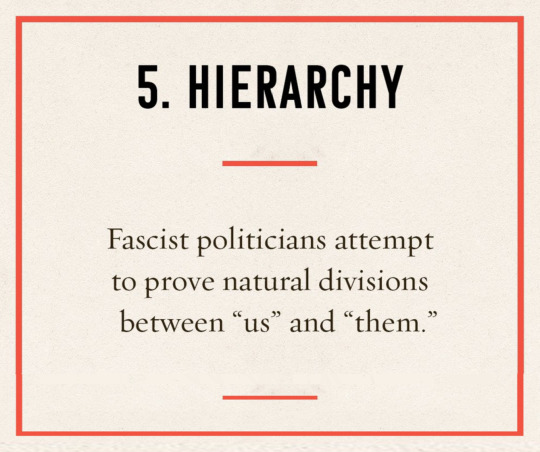
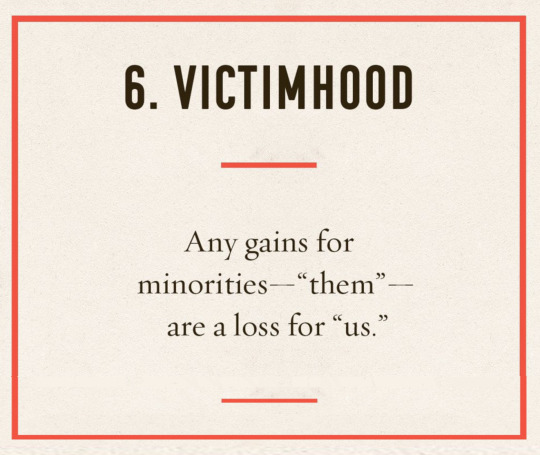
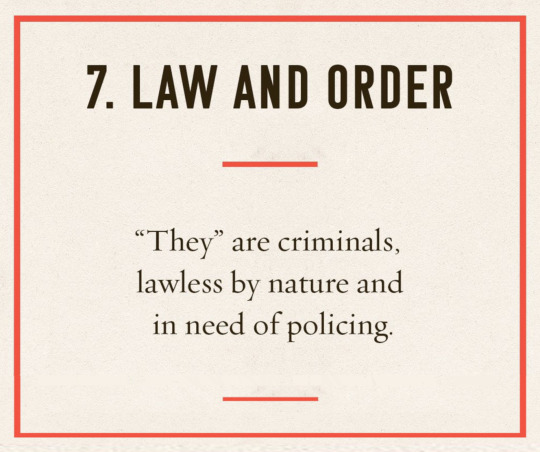

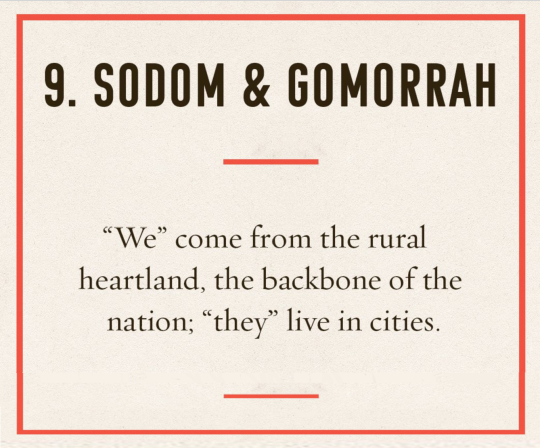
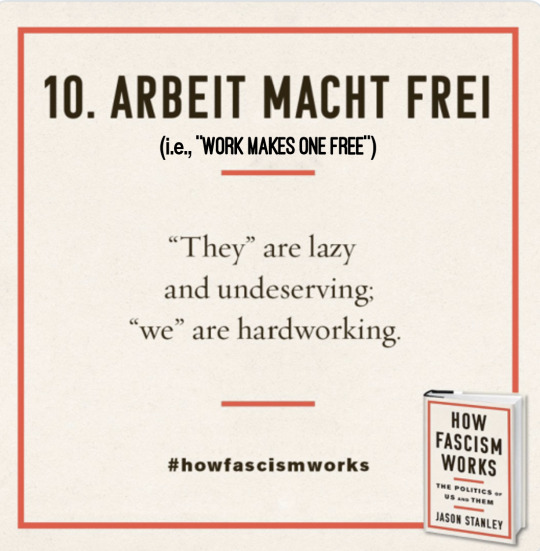
The Ten Pillars of Fascist Politics by Jason Stanley
Above is a July 6, 2021 twitter thread by Yale philosophy professor Jason Stanley, PhD, which outlines the 10 pillars of fascist politics. It shows just how fascist most of the Republican Party has become under Trump’s leadership. The current MAGA GQP has incorporated each of the above 10 pillars into its talking points and philosophy.
This is why the GQP has been up in arms about Biden accurately calling their Trumpist political ideology “semi-fascism.”
Feel free to share this with your relatives and friends who want to defend the direction the GQP has been going in. [Just be prepared when they counterattack to explain why the Democratic Party is not “communist” or “socialist,” but a center left political party, with its most extreme members being social democrats (even Bernie Sanders and AOC aren’t really democratic socialists)].
[edited]
_______________________
Note: The visual formatting of how the original tweet in the thread appears, as well as the visual formatting of pillars number 2 - 9 were modified from their source; furthermore, the translation of “ARBEIT MACH FREI” AS “WORK MAKES ONE FREE” was added to pillar #10.
#the ten pillars of fascist politics#jason stanley#how fascism works#us politics#republicans#gop#gqp#trump#maga republicans#fascism#my edits
9K notes
·
View notes
Text

16 notes
·
View notes
Photo

Editor’s note: Bookish Bits is a regular literary writing column on Can’t You Read. Featuring both traditional book reviews, and expanded essays, this book blog encompasses all of my writing about the volumes in my extensive library.
Birdwatching With Liberal Antifascism: A Review of “How Fascism Works: the Politics of Us and Them” by Jason Stanley.
If you've been reading my anti-fascist analysis long enough, you'll know that I'm often quite critical of the imagined efforts of "liberal antifascists" in the Pig Empire. This is in part because foundationally, it's awfully hard to be an effective antifascist without also being an anticapitalist. It has also been my experience however that affluent liberals in positions of actual power are often far less interested in fighting fascists, than protecting their own wealth; if forced to choose between the two, they will quickly abandon all pretenses at opposing the fascist creep and side with hierarchal capitalist power to the bitter end. There is after all a reason I refer to this as our collective "Weimar America" period.
How then are we to approach an intelligent, well-read, genuinely sincere liberal antifascist? Even more perplexing, what does a reasonable observer do when this sincere liberal antifascist has produced what amounts to a fantastic birdwatching guide that allows even small children to recognize fascist politics in action, but offers up only vaguely reformist solutions that flatly will not stop the fascist creep? In short, how do we address a book like Jason Stanley's 2018 work "How Fascism Works: The Politics of Us and Them?" In the end, I've decided that the only honest way forward is to critique what Stanley's book is, rather than focus on what it is not.
So what is it? Expressed simply, How Fascism Works is a collection and analysis of ten objectively fascist political tactics being used to seize control by contemporary far right, ultranationalist movements across the Pig Empire. A study of both rhetoric and process, the author's work isn't about fascist governments, so much as the political movements that put them in power. Although Stanley does spend some time discussing twentieth-century fascist regimes like the Nazis in Germany, or Mussolini's fascist Italy, his focus is very much in the here and now, along with the type of reactionary, eliminationist politics that empowered leaders such as Narendra Modi in India, Jair Bolsonaro in Brazil, and of course Donald Trump in America.
Just what are these fascist political techniques? Stanley identifies them as a call to a "mythic past," inverted reactionary "propaganda," fervent "anti-intellectualism," the enforcement of "unreality," insistence on the existence of a natural "hierarchy," imagined "victimhood," rigid enforcement of authoritarian "law and order," manipulation of "sexual anxiety," casting internal lifestyle differences in the mold of "Sodom and Gomorrah," and otherized presumptions about work ethic and productive value to society. Although each of these pillars are individually present in all types of reactionary politics across the Pig Empire; taken together, they represent clear evidence of a fascist movement in progress - which is the best time to identify fascism; since once it's no longer a fascist movement, but rather a fascist regime, it's far too late to stop it.
Within the narrow, but still relevant confines of studying fascist political practices on the path to power in a faux liberal democracy, I'd have to say How Fascism Works is a smashing success. Drawing heavily from thinkers like Eco, Adorno, and Arendt, Stanley's analysis highlights not only the practices of fascist politicians, but also why they're so effective in convincing the classic "authoritarian personality" type to surrender all autonomy, and indeed rational thought, to fascist charlatans and strongmen. In this regard, Stanley's book might more accurately be called "How Fascism Works (on bootlickers, to dismantle capitalist faux democracies)" instead. Still, for folks primarily concerned with the practical realities of identifying modern fascist movements, and unwinding their poisonous political arguments, How Fascism Works will definitely deliver the goods.
Which unfortunately brings us to the pushback against Stanley's work, and why How Fascism Works is simultaneously a valuable resource, and a dangerous diversion from effective antifascist practices. While many reactionary observers have criticized Stanley for failing to define what fascism is; I don't think that critique is accurate or in good faith. Stanley does define fascism in a purely political context; wingers simply don't like that his definition accurately describes their current political practices. The author clearly states he's not talking about the policies of established regimes, or even the ideology of fascist movements, but rather their methods of acquiring power; you can't crush a guy for failing to write the book you would have preferred to read, and I don't give two wet horse apples whether or not American fascists dislike a Yale professor calling them, well, fascists.
Perhaps more surprisingly however, How Fascism Works has also drawn criticism from some antifascists; particularly those like myself, who largely agree with Trotsky's analysis about what fascism really is, and why it is unleashed by the ruling classes in a liberal democratic society that appears more free than it is. There is literally no anticapitalist component to either Stanley's analysis, or his wholly inadequate proposed solutions; which more or less boil down to "liberal politicians need to be better true liberals and we all need to vote harder to protect our democratic institutions." The end result is in effect a wonderful book about types of nazi birds, and the modern habits of those birds, without much discussion of why the birds are there and what to do if they're trying to kill you for capitalists and hierarchal power.
Does that ultimately matter? Well, that depends on what you want a book like How Fascism Works to accomplish. In light of its widespread popularity, I would say it has been an effective part of the mainstream discourse that has finally at this late a date, allowed liberals to accurately describe the American right's current evolution as fascist; albeit, tepidly so. By that same measure, Stanley's insistence that the liberal democratic order that birthed this fascist movement is the only answer to the problem, probably hasn't helped many of those people become effective antifascists; as evidenced by the fact that Joe Biden has been president for almost two years, and American fascism is still growing politically stronger by the day.
In the final analysis, all of this makes Stanley's How Fascism Works a wonderfully written, extremely informative "birdwatching" book for liberals who'd like to be antifascists, but don't know how to spot and resist the fascist propaganda all around them. If you're looking for an accessible way to get your Dem-voting Auntie who really misses the quiet dignity of bygone liberal politicians like Bobby Kennedy, or John Lewis, onside in the war against contemporary fascism, this is probably the book you want to buy for her. If on the other hand you're looking for a deep theory discussion about why capitalist societies are always capable of turning fascist at any moment, and how we can stamp out the serpent of violent reaction forever; this book doesn't have a whole lot to offer you.
On the basis that you can't punish a book for failing to be something it never promised you in the first place, I'm going to give How Fascism Works three and a half stars. Although I acknowledge that Stanley's work here is excellent, his ideological concessions to capitalist realism make it impossible to call this great antifascist scholarship. Plus I felt obligated to dock him a half star for excessive West Wing-esque rhapsodizing about liberal democratic institutions that can't stop fascism; because they were designed by, and are controlled by, reactionary capitalists who prefer fascism to sharing.
nina illingworth
Anarcho-syndicalist writer, critic and analyst.
You can find my work at ninaillingworth.com, Can’t You Read, Media Madness and my Patreon Blog
Updates available on Twitter, Instagram, Mastodon and Facebook.
Podcast at “Kropotkin’s Barbershop” on Soundcloud.
Inquiries and requests to speak to the manager @ASNinaWrites
Chat with fellow readers online at Anarcho Nina Writes on Discord!
“It’s ok Willie; swing heil, swing heil…”
#Bookish Bits#Fascism#American Fascism#Jason Stanley#How Fascism Works#Nina Illingworth#book reviews#antifascism#US Politics#liberal antifascism#anticapitalism#Donald Trump#Joe Biden#Trumpism
9 notes
·
View notes
Text
Reading “How Fascism Works” by Jason Stanley (2018, Random House), and this passage stuck out to me:
In Nazi ideology, Jews operate with the same hierarchical views of nature as Nazis do, but use the universal principles of liberal democracy as a façade to advance it.
It reminded me very much of Roman Roy’s various critiques of his siblings’ more liberal impulses.
I think sometimes there is a tendency, especially among Roman apologists (a group among which I count myself) to cut his character some slack, because his siblings, as fellow members of his hyper-privileged caste enjoying the unearned fruits of their position, are to some degree poseurs and hypocrites.
But I also think it reflects a deeper, more ingrained level of fascist ideology in him - the belief that everyone, fundamentally, is playing the same game of striving for dominance.
(More under the cut.)
It’s also interesting how on election night, he is quick to write off the firebombing of the ballot counting centre in Milwaukee as an action by ANTIFA.  It is my interpretation that Roman fully knows better, on a rational level; but the fact the thought is almost-plausible to him - enough that he can argue it on multiple occasions that night with a relatively straight face - seems, to me, to suggest that there is some part of him that expects his opponents to use the same tactics as ‘his’ side does.
And then, the next day, after his father’s funeral - when he is face-to-face with people who are tangibly passionate and upset about the election call he championed - he yells at them that they have no idea how any of this works.
And on the one hand, that can be read as him aggressively telling them to fuck off, because they’re tiny ants whose voices don’t matter, no matter how hard they yell;
or, perhaps, attempting to assert that none of it really matters, because Mencken isn’t really as bad as they think he is, and it’s all just bullshit and posturing (which, I believe, is how Roman, as a queer man who definitely knows he’s queer, justifies Mencken to himself; as evidence, I will point to his insistence to Shiv and to himself on election night that they simply “made a night of good TV; nothing happened.”).
But it could also be read as a cry of frustration; of “Don’t you get it? This isn’t how the game is played. These aren’t the rules. What are you doing out here, with all this sincerity? Put that away.”
Finally, a little (optional) context:
If it seems like I’m bending over backwards to defend my favourite blorbo, that’s probably a somewhat fair critique; if Roman Roy were real, I certainly would never give him this much of the benefit of the doubt.
But I was raised with what I now realize was a lot of really fascist ideology, and examining how that kind of ideology was able, for many years, to nominally coexist with and, at times, override, my better, more human impulses is a very interesting exercise, and one that’s much easier through the lens of a fictional character.
#fascism#politics in succession (hbo)#roman roy character analysis#roman roy’s politics#roman roy and fascism#roman roy and the alt-right#how fascism works#jason stanley
1 note
·
View note
Text
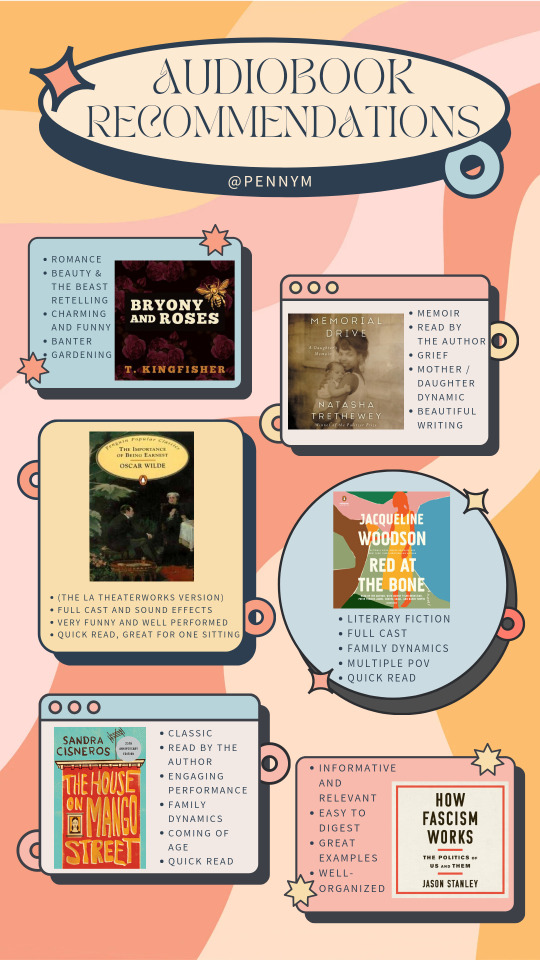
some audiobook-specific recommendations from a variety of genres! id is in alt text and as always pls check storygraph/goodreads/etc for content warnings if you need them <3
#book recommendations#book rec list#bookish#bookblr#audiobook#audiobook recs#bryony and roses#memorial drive#the importance of being earnest#red at the bone#the house on mango street#how fascism works#my post
0 notes
Video
youtube
“You're not free if you are lied to“
1 note
·
View note
Text
Signalis, Authority, and History
There's a level of nuance to how Signalis presents the violence of the authority of the nation that doesn't call attention to itself but which I really appreciate. Which is basically just, all the officers and cops and spies who make life hell for people like the Gestalt mine workers, Ariane, and the Itou family--we get little glimpses into who they are in Adler and Kolibri's diaries and despite the propaganda and the authoritative tone they take in official communications, for the most part they don't seem to actually be particularly invested in the hard line of national ideology. They uphold it though, viciously, both because things were worse under imperial rule (we don't get hard details on what it was like but it's mentioned in passing enough that I believe it) and because they're scared that if they don't they will be decommissioned and easily replaced. They are literally stamped out of a production line after all. There's a subtext of well, if I don't do it my replacement will anyway and I'm not trying to die so what's the point of rocking the boat?
I think Kolibri stands out to me most clearly on this because in communications from the block warden regarding Ariane there is emphasis put on how it is unacceptable and suspicious that she should be so interested and invested in art and literature that does not serve the purpose of furthering the goals of the nation. But we know that Kolibris themselves are bookworms, Adlers are fiends for stimulating experiences, and both get miserable FAST when deprived of art and puzzles and entertainment and hobbies. Y'know, just like anyone. Far be it from being a paragon of The Nation only interested in productive labor, we are reminded that the block warden, too, hates this shitty town and wants to transfer but is denied. They're hypocrites, but not monsters, nor brainwashed puppets of the state.
The monstrousness at play is not contained within any particular subset of evil individuals, or even an inherent universal force of evil contained in the broad notion of The Nation. There is no cosmic evil force that makes them all do these things to each other. The monstrousness is within the social systems, the mechanisms of how authority perpetuates on a structural procedural level, held in place by fear and tangible threats of violence, each link in the chain restraining the next through those threats out of fear that if they don't, then they'll be next. Regardless how many, if any, of those people in this chain are true dogmatic hardliners, they must act as such because failing to do so opens them up to danger.
Here then I think of the quote that is so prominent, "Great holes secretly are digged where earth’s pores ought to suffice, and things have learnt to walk that ought to crawl", from Lovecraft's The Festival. This is not just a chilling abstract visual that conveniently evokes a mineshaft-- in Lovecraft's story, this line refers to worms which ate the decomposing bodies of wizards whose wretched souls had remained after death, complete with the terrible powers they gained through contracts with demons. Those worms inherited both their power, and also the evil. The Nation, despite having overthrown the Empire, is built on imperial technology, in particular Replikas and bioresonance. So too, then, we can imply that The Nation inherited with those things some of the monstrousness of The Empire as well. There is no end of history, nor clean break with the past, no matter how violently it may seem to be rejected. That which remains from the past--and something inevitably always does--creates the present.
This is a game that is not shy about evoking East Germany. And I think all of this provides a sophisticated picture of repressive authority that we rarely see in fiction of the English speaking world, especially in games. The year the S23 incident takes place is notably 84, but, frankly, I find this to be more compelling and illustrative than 1984 (and I'm a librarian and have taught English classes so I get to say that). Orwell, let's be honest, presents a fairly one dimensional picture of authority, where people seize power and wield it against others out of seeming mustache twirling evil or malice.
Here though we get a more humanistic view. Authority did not come from nowhere and is not wielded arbitrarily out of gleeful cruelty or mindless brainwashed allegiance. People aren't "just following orders". Individuals have rich inner lives. They make decisions, and those decisions are based in the context they're in. Even the decision to carry repressive tools of the past into the present is a decision that was made strategically with the big picture in mind. Nobody woke up and decided to be evil that day. Everyone operates on self interest, and, we must assume, an earnest desire for things to get better. Even the [spoiler] program which served as an inspirational demonstration of The Nation's power, you can imagine the chain of officers and bureaucrats who genuinely wanted the people of the nation to believe in the future, to confidently trust that everyone was working together towards something great and beautiful. And, through a long chain of those people who couldn't say "No" without being decommissioned, we ended up with something unbelievably cruel.
We get to know Adler and Kolibri and the other officers not to say well they're human too, maybe it wasn't so bad that they condemned all those people to agonizing suffering, but to remember that if we keep looking for true monsters we will not find them. There are no monsters and there are no demons. There are only people making decisions. A better world is possible. A better world, where Adler is just a paper pusher who does puzzles after work instead of signing papers to authorize torture, where Kolibris are librarians instead of spies and cops, where EULEs can gossip and play piano and ARARs can do maintenance on facilities that don't contain torture rooms, is one that would not have led to the Ariane and Elster's tragic cycle and ultimate end.
Authority and its attendant cruelty is not contained, radiating forth from The Great Revolutionary and Her Daughter, it is within the social systems of control. When those two women die, that cruelty will continue so long as those social systems continue. Like Lovecraft's worms, no matter how long dead the evil of the past is, so long as it continues to be fed upon, that evil will not only remain, but evolve into something new in the present. A better world can't be achieved through the death of the old world alone, even if violent overthrow is warranted. There is no end of history. There is no clean break from the past.
"Men make their own history, but they do not make it as they please; they do not make it under self-selected circumstances, but under circumstances existing already, given and transmitted from the past. The tradition of all dead generations weighs like a nightmare on the brains of the living."
Karl Marx, The Eighteenth Brumaire of Louis Bonaparte
#Signalis#Didn't include everything because this is already very long#But there's a lot to add to this kind of reading from other former Eastern Bloc states that go beyond a kind of braindead#Simplistic Authoritarianism bad communism bad freedom good type of view common in the English speaking world#That go more into well what is authority and how does it work and how has it remained durable and violent before during and after the cold#The Romanian movie Bad Luck Banging is very good for this in expressing how things have been more similar than different#Under monarchy fascism communism and liberal democracy over the last 150 years there#replika joker voice maybe the real monster is SOCIETY#op#quality content
86 notes
·
View notes
Note
feel free to ignore if this question is too dark, cw themes of war and genocide (i know i’m so sorry)
how deep does thistle law go? what is the end goal of someone with that ideology? is it a permanent state of the four clans fighting forever, or is the end goal of someone who believes in thistle law to absorb all four clans into whichever clan they hail from? is there any split between thistle law thinkers on this, kind of like the splits between traditionalism and hard traditionalism? i’m curious on just a general worldbuilding level, but like i said, i know this is a super dark and heavy question, so do feel free to ignore it, i don’t want you to have a bad time. ik better bones gets pretty deep but if you’d rather steer clear of this one entirely i understand.
The stated end goal is different between every incarnation of Thistle Law. Brokenstar was explicit in that he planned for the destruction of the other three Clans, where Tigerstar called for assimilation, and Mudclaw just desired WindClan to be operated for the benefit of WindClan cats.
But it doesn't matter what they think they believe. The built-in conclusion of Thistle Law, and of ALL Fascism, is genocide. That link is to a post where I talked a bit about what would have eventually happened to RiverClan under TigerClan.
If blood can be impure, and the pure race is tainted by association with the dirty race, allowing groups to mix is an existential threat. Every birth for Them is a loss for Us. It will eventually come down to anti-miscegenation, then segregation, then mass murder.
The line between Hard Traditionalism and Thistle Law is usually some desire to begin enforcing a standard of purity, typically the elimination of the Queen's Rights. In the case of Brokenstar, this had less to do with blood and more to do with spilling it; his warriors would need to be loyal to destroy the other Clans.
Every warrior is an individual. There's some supporters of Thistle Law who have actual principles they want to stick to; but most will fall in line behind a strongman leader. The thing about authoritarians is that they HATE intellectuals and they LOVE submitting to hierarchy; so you will not find the same "width" of different beliefs within Thistle Law that you do within the Traditionalist or Fire Alone spectrums. No part of what they do is driven by rationality.
So to answer the question directly, how deep does Thistle Law go? Not very far. It's a shallow grave. Evil is deceptively simple.
#tw fascism#tw genocide#Thistle Law#tw segregation#tw bigotry#One of the limitations of BB as an adaptation of canon is that I can't really delve into HOW bad TigerClan should be...#I wish I had a ton more characters to work with to kill off en mass#But for the record I am planning to have a POV in TigerClan at some point#A rework of Sasha's stuff#better bones au
93 notes
·
View notes
Note
https://www.tumblr.com/qqueenofhades/741612605875027968/as-someone-whose-country-went-through-a-brutal
I frankly think the problem is that people who post about the "worthlessness" of the vote are a combination of people who've lived with the privilege their entire lives and thus don't recognize its value, and of people who think that doing ANYTHING that is part of the establishment is inherently dirty and needs to be avoided to maintain their ideological purity. And mixed together with an unhealthy dose of capitalistic undertones of instant gratification that they've never truly reckoned with.
Because that's what this is really all about; keeping their own hands unsullied of what they see as a poisonous system, where the establishment is inherently bad no matter what good elements are still left trying to be fixed and improved, and they want the results immediately regardless of the consequences.
As it's been said before, as horrid and evil as the fascist right are, they did their due diligence for over 50 years, putting their zealots into various positions of power year after year, decade after decade. because they were willing to go through their own hell in order to ensure that the poison trees they were planting would bear fruit, even as they have their clowns and assholes to distract the rest of us. I have never seen that kind of single-minded long term thinking in a very large majority of online types.
I mean, last night I received an anon scolding me about how I was "driving away young leftists and liberals" by whatever I was saying on Tunglr dot hell (which has consisted almost in its entirety of forcefully telling them to vote, to not be antisemites, and that yelling at a cancer hospital wasn't going to magically awaken more people to the Rightness of your Cause and actually backfires on the cause you're claiming to help). And while the urge to do a forensic and deeply salty response was Strong, I reminded myself to do the smart thing and block it. Which I did, but also I'm still wondering how, if these precious snowflakes are indeed "driven away" by someone telling them to vote and not be antisemites, then yeah, we're doomed. It was also entirely likely that this was the usual version of "not a threat-threat" wherein if I don't stop telling people to vote on Tunglr dot hell, apparently this might cause the entire moral continuum of the universe to collapse and it will be my fault. Sorry if I haven't been always totally nice about it, but after eight years of dealing with this bullshit nonstop, my patience is now deeply limited.
Anyway, my point here is that if this is actually what we're dealing with, wherein they will blow right past the most basic of advice about how to actually do something and not just get short-term Moral Good Person Cookies out of it, coming from someone who actually agrees with what they want to do and the changes they want to see in the world, in order to focus on This Personally Made Me Feel Bad :(, then yeah. We're doomed. On the other hand, as scolding anons on Tunglr dot hell are again, hardly representative of the actual state of things, it likewise should be taken with a healthy grain of salt.
#anonymous#ask#politics for ts#look#if you can't understand basic reality#how the us government works#how the world works#how fascism works and is yet again coming VERY close to taking over#in favor of feeling bad because i bluntly told y'all to vote and stop being antisemitic: *get it together*#i mean it from the bottom of my heart
49 notes
·
View notes
Text
not directing this at anyone in particular but lest we all forget... kim kitsuragi IS a cop and a centrist and acab DOES apply to him
he can be your uwu gay bby that's fine but he does make it clear he's chosen pragmatic moralism. so just like... think about that perhaps.
#kim kitsuragi#disco elysium#kim is a cop propping up the centrist moralist governments#and being (justifiably) well loved across the fanbase#does not excuse him from the implications of his political leanings#to be clear i'm not condemning him. de posits varied arguments for and against various political leanings#(except fascism which is obviously given a hard no)#but critical reading of the different narratives demands a nuanced approach#to kim and harry in their position as cops#this is not “all cops are bad except kim” or “all cops are bad including kim”#but “as great an individual as kim is he is also a cop working for the moralintern system”#anyway i've been thinking about how to reconcile playing cops or law enforcement characters#with how we feel about them or how they're depicted in their source media#because i very much do want to write and explore kim's character but i cannot ignore his position#ooc ⇨ talk
30 notes
·
View notes
Text
can’t wait for roman fascism arc when everyone will post ab ‘oh my god at least no other character in the show is a literal fascist’ like kendall didn’t get compared to hitler for the dystopian fascistic project he rebranded to sound progressive and cool and For The Future literally like two episodes earlier
#different brand of fascism i know. but fascism none the less#they r all aiding and abetting fascism. all of them#that’s how it works#succession#succession spoilers#not saying they’re equal or whatever but like. come on#ur missing half the show’s commentary here
29 notes
·
View notes
Text
"i just want thrawn to have a happy ending, man" ok well i don't. he dug his fascist grave and he'll die in it and this is the best possible ending for this character i adore. love and light
#he voted for the leopards eating ppls faces party. hes gonna get eaten by leopards. this is how fascism works#cecil drawls
10 notes
·
View notes
Text
I’m truly sorry your humanity is so far gone that you genuinely believe genocide is not only justified but should be the moral response to any perceived oppression but literally no one asked you and we don’t fucking care.
#g talks#antisemitism#im so tired of twitter’s response to literally anything#y’all called hozier Irish jesus like a week ago#and now suddenly he’s stupid and deserves cancellation#because he…knows Israelis are citizens and not their government#like y’all are all so anti fascist yet don’t know how fascism works#it’s actually laughable#‘well they voted!!!’#have you heard of the word corruption?#do you know what far right people do?#you know how they lie and cheat to get elected in the us and the. do whatever tf they want#yeah that’s not specific to the us#fucking morons#mine#/mobile#/okay to reblog
13 notes
·
View notes
Text
I kinda like all Van Helsing's monologues bc it's I think amusing and charming that this man cannot get through a conversation without bursting into like 5 diatribes that make varying degrees of sense, but this one really actually does move me deeply bc I think we all know what he's talking about. Crying and laughter are so intimately connected, and there is often so much cathartic laughter at funerals, wakes, memorials (when its hosted and attended by people who really did know and love the deceased). Periods of terrible trial often come with periods of laughter at something objectively horrible. It is uncontrollable, it is king, and it is kind.
#dracula daily#makes me think of a guy I worked with this summer who sadly I doubt will be alive much longer#terminal cancer and his only hope is an experimental treatment that doesn't sound all that promising tbh#but he would often laugh about how he hears things on the news like haha suckers good luck dealing with the state of the world#I'm getting out of here soon#i don't have to get anxiety about this it ain't gonna effect me#good luck with climate change and rise of fascism bitches I'm dying of fucking cancer#and like that in his and my opinion is a kinder and healthier way to exist than in a state of constant dread
73 notes
·
View notes
Text
I just watched this video and I think it is very informative and with the way the far right political groups are going this discussion might be very important.
(some of the clips from the game are a bit gory, be careful if that is not for you.)
youtube
9 notes
·
View notes
Text
if you're coming into my reblogs to add shit like "religion and culture are evils that need to be excised" I'm immediately just clocking you as some kind of soulless troll and blocking lol. why do u even follow me
#im a fucking heathenous anti-christian apostate and im not as spiteful and fun-hating as you#wormds#also huge implications with that whole “good and pure things” spiel#sorry you havent figured out how fascism works but thats literally the groundwork for it
5 notes
·
View notes